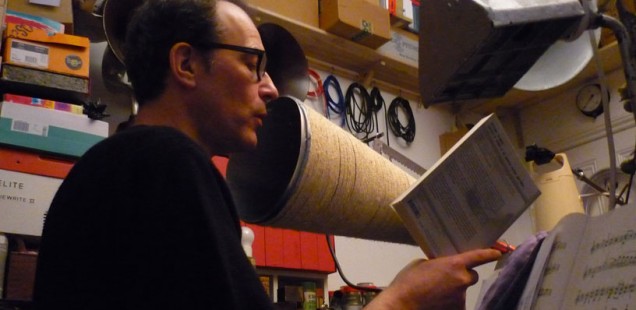
Ken Hollings
Photo: © Michael Esposito
Recorded in London on March 21st, 2011.
Ken reads an extract from his book Welcome to Mars:
“An ever-expanding, subdivided tract of land, the suburbs constitute the location for a project that will connect humanity directly with outer space, with the future and with its own emergent inner self. The possibilities are limitless. Levittown homes already come with a television set already installed. What was formerly designated the ‘living room’ is now a domestic environment, irradiated by the blue-grey glow of the cathode ray tube.
High-fidelity stereophonic sound systems will extend the boundaries of this new sensory laboratory even further. In 1947 Capitol Records brings out Music Out of the Moon, a suite of compositions on a set of 78 rpm platters with characteristically mellifluous arrangements by Les Baxter. This sequence of six themes features the mysterious sounds of Dr Samuel Hoffman at the Theremin, the electronic musical marvel from the Soviet Union that can be played by the simple expedient of waving one’s hand in what appears to be empty space. Even more otherworldly in their effect are the wordlessly lush close-harmony choruses Baxter has set running through the course of each song. Eerily streamlined and enigmatic, they flesh out what titles like ‘Lunar Rhapsody’, ‘Moon Moods’ and ‘Celestial Nocturne’ can only hint at. More importantly, as the sleeve notes suggest, the record requires its own specific setting. ‘Take it home,’ the listener is advised. ‘Set the stage, in the evening when you are perhaps a little weary of the work-a-day world; its hypnotic beauty assures a unique musical experience.’
More specifically, it articulates the concept of encountering space-age technology in a space-age home. In its self-contained isolation, the suburban colony becomes a model for life not just on this planet but on all the others too.”
Extract from ‘1947 – Rebuilding Lemuria’, Welcome to Mars: Fantasies of Science in the American Century 1947-1959, Strange Attractor Press, London, 2008.
Ken Hollings is a writer based in London. His books include Destroy All Monsters and Welcome To Mars, and his essays have appeared in numerous journals, anthologies and collections.
Recording Notes:
Ken wrote of this recording session on his blog:
“I practised my short reading while Aleks switched on a lamp over the cylinder, set it spinning and waited for the wax to soften before a recording could take place. It had never occurred to me that the voice was inscribed into a soft substance – I always had an idea of it being carved out of something brittle and hard. My second misconception was over how to approach a horn rather than a microphone. Working with mikes, you want to keep your face back from it in order to avoid popping and paper rustling – and after two days of recording my recent Essay series for Radio 3, I was more aware of that than ever. Instead Aleks was constantly instructing to get my face as far into the horn as possible while still being able to read from the copy of Welcome to Mars I had brought with me – images of Jean Cocteau leaning forward reciting poetry into the elaborate horn megaphone in production stills for Les Mariés de la tour Eiffel filled my head as I struggled to keep the page in focus out of the corner of my right eye and read out loud at the same time.
Aleksander had also stipulated that I would have to speak very slowly and very clearly and enunciate every last syllable. The device, it turns out, really does have formality built into it: you find yourself addressing it, rather than some unseen audience. We recorded a two-minute cylinder, waited for it to cool down and then played it back on a separate machine mounted with a massive horn. I have never heard my voice sounding like that before – normally I cannot bear to hear it, but the grain that a cylinder recording brings introduces to your words makes them sound completely different – ‘other’. It does not copy, simulate or even echo you; it is a separate entity – something that comes from the machine and only from the machine. The clicks and pops formed an unexpected accompaniment to my delivery – I was enthralled by the whole thing.”
Ken Hollings, 2nd April 2011.

Recent Comments